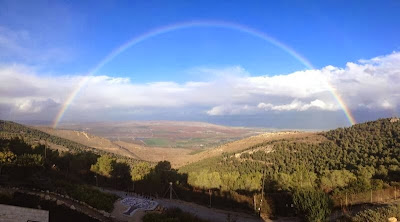Last week I wrote about ‘the storm.’ I wrote this last post
on a Friday afternoon sitting in Ra’anana where hailstones were the most
dramatic weather activity we saw. The radio and TV turned off as Shabbat came
in and we battened down the hatches in preparation for a very rainy and dreary
Shabbat.
 |
| Hail Catching: a unique, highly competitive Ra'anana sport. |
We snuggled in blankets, read and relaxed. It was actually very
restful. The sun even made a brief appearance on Saturday afternoon, giving us
enough time to take a long walk.
 |
| Ra'anana's version of 'the storm.' |
Little did we know that many parts of the country
experienced weather of epic proportions that became THE WINTER STORM of the
century. Like hurricanes and tornadoes, it was even given the name Alexa, although
many native Israelis thought ‘vilde chaya,’ ‘gevalt’ and ‘oy’ would be more
appropriate names.
 |
| The Golan after 'the storm.' |
Snow fell, making many major highways impassable. Thousands
of people were stranded on roads, including families with small children who
sat for hours in the freezing cold. Many abandoned their cars and had to be
saved by the army.
The heavy wet snow then caused tree branches to fall on
power lines across the country, plunging thousands of family into cold and
darkness over Shabbat.
In Safed, where they received almost two feet of snow, roof
caved in from the weight of the snow. Trees fell on cars and on homes.
Electricity was out, causing thousands of residents to sit in the cold and
dark.
A friend of mine who lives in Tsfat looked out to Meiron.
The normally verdant green mountain was cloaked in white. It was beautiful yet
eerie as she did not see one light twinkling from the town of Meiron and the
surrounding moshavim; everyone sat for days shivering without power. The road
to Tsfat was impassable until Monday. And schools in Jerusalem remained closed
for a few days after the storm as tow trucks removed countless abandoned cars
from highways.
On the plus side, emergency vehicles were ready to help.
Families with electricity took in those who were cold and hungry. For a country
without proper snowplows and for citizens who do not own shovels or snow tires
or snow boots or toboggans, we coped quite well.
As Jerusalem blogger Mitch Ginsburg aptly wrote, eight
inches of snow is, according to a “Middle-East-dog-year calibration,
equivalent to, say, 34 inches in Toronto, 21 in NYC and two in Cairo."
 |
| Israelis learn to love snow. |
I am sitting writing this blog in
Toronto in a warm, centrally heated home, looking out at snow, snow and more
snow. Homes are so well heated here, you
could live indoors in a bathing suit and be toasty. In Israel, our poorly
heated home is often colder inside than out, forcing me to wear a jacket indoors
all day long.
Being in Toronto now, I can see that
this city is 100% committed to bad weather.
There is a storm watch channel constantly updating commuters. Everyone
has thick boots with treads, Arctic-grade jackets and state-of-the-art snow
tires. So hot, sunny Israel with its
date palms and orange groves gets top marks for dabbling in the challenging
world of the winter storm.
 |
| Wintry Toronto. |
















